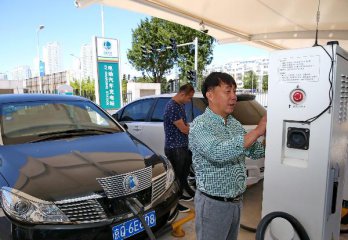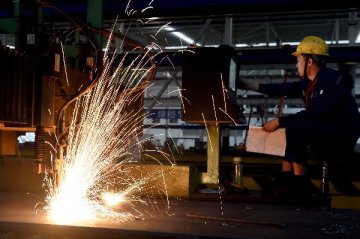
China and Singapore can increase cooperation under the Belt and Road Initiative via setting up platforms for connectivity, finance and third-party market, Chinese Foreign Minister Wang Yi said Monday.
Wang made the remarks while holding talks with his Singaporean counterpart Vivian Balakrishnan, who paid an official visit to China from Sunday to Monday.
Hailing the sound development of bilateral ties with Singapore since the beginning of this year, Wang said the two countries need to continue to implement the consensus reached by both leaders and promote the "partnership of all-round cooperation in keeping with the times."
China welcomes Singapore's participation in Belt and Road construction and is ready to work with the country to carry out the Belt and Road MOU, Wang said.
Balakrishnan said the Belt and Road Initiative is of historic importance and Singapore has supported it from the very beginning as it connects Asia, Europe and Oceania and brings prosperity to all.
Singapore is an important point along the Belt and Road and could provide support to the financing of the initiative as it is a regional financial hub, Balakrishnan told media at a joint press conference held after the talks.
The connectivity projects conducted by Singapore and China in southwestern China's Chongqing Municipality could also join the land and maritime Silk Roads, he said, adding that Singapore is willing to better align its economic development strategies with China.
This year marks the 15th anniversary of the establishment of strategic partnership between China and the Association of Southeast Asian Nations (ASEAN).
On China-ASEAN ties, Wang said both sides need to think about how to upgrade the partnership to a higher level with greater influence in order to contribute more to regional development.
He called for the early completion of the Regional Comprehensive Economic Partnership (RCEP) talks and the establishment of the East Asian Economic Community, adding China believes that Singapore will add wisdom and strength to the healthy and stable development of China-ASEAN ties.
Balakrishnan said Singapore has always viewed its relationship with China from a strategic and long-term perspective. Singapore will continue to forge ahead with three flagship projects with China in Suzhou, Tianjin and Chongqing and further promote bilateral ties, he said, adding that the country fully agrees with China on the establishment of three platforms under the Belt and Road Initiative.
He said Singapore is willing to take on the opportunity to be a coordinator country between the ASEAN and China and, when it becomes rotating president of the ASEAN in 2018, to advance cooperation in politics, economy, and trade and culture so as to add new impetus to China-ASEAN ties.
On the South China Sea issue, Wang suggested China and ASEAN members conduct negotiations on the contents of the Code of Conduct (COC) in the South China Sea at an appropriate time after a period of preparation.
Senior officials from China and the ASEAN agreed on the framework for the COC in the South China Sea on May 18. An important experience gained from the talks on the framework for the COC was creating a sound environment and clearing away outside distractions, Wang said.
It is set in the Declaration on the Conduct of Parties in the South China Sea (DOC), and also a commitment of China and ten ASEAN members, to negotiate and form the COC, he added.
China and the ASEAN have the ability to draw up regional rules to safeguard the peace and stability in the South China Sea on their own, Wang said.
"As long as China and the ASEAN can continue to increase mutual trust, enhance cooperation and remove possible disturbances, especially from the outside of the region, the negotiations on the COC can be conducted," Wang said.
Chinese Vice President Li Yuanchao and State Councilor Yang Jiechi also met with Balakrishnan on Monday.






















Latest comments